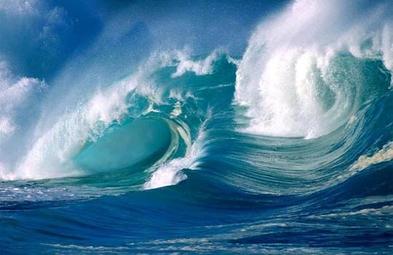The Ocean
The ocean covers 72% (and rising) of this small planet and is home to most of the globe's biomass, or living matter, and biodiversity. We know that from bacteria to plankton to the blue whale, life in the ocean affects life on land, yet we know very little about the ocean. At least 80% is yet to be explored.
The ocean is studied by separating it into different scientific disciplines. To understand life in the sea we must consider the big picture: marine life and its interaction with its environment, as well as other life, including humans.
The chemical properties of the ocean are important to understand because the marine environment supports the greatest abundance of life on earth. This life is made up of the same chemicals that makes the ocean—water and salts.
Evaporation and precipitation determine the salinity of the ocean in any given region and both of these processes depend on energy from the sun. Heat from the sun drives the ocean currents and modifies our climate. Sunlight also provides an energy source for the photosynthetic processes of phytoplankton, on which most life in the sea depends.
http://marinebio.org/oceans/
The ocean is studied by separating it into different scientific disciplines. To understand life in the sea we must consider the big picture: marine life and its interaction with its environment, as well as other life, including humans.
The chemical properties of the ocean are important to understand because the marine environment supports the greatest abundance of life on earth. This life is made up of the same chemicals that makes the ocean—water and salts.
Evaporation and precipitation determine the salinity of the ocean in any given region and both of these processes depend on energy from the sun. Heat from the sun drives the ocean currents and modifies our climate. Sunlight also provides an energy source for the photosynthetic processes of phytoplankton, on which most life in the sea depends.
http://marinebio.org/oceans/
Marine Life
The oceans are full of life. A wide variety of animals and plants must survive together. Invertebrates like crabs, starfish and worms roam the sea floors. Coral grow in large numbers, making a home for these creatures.
Schools of fish swim the depths also looking for food to eat. The trigger-fish looks for a stray crab in a reef while a group of tuna pass by. They must stay alert, because the tiger shark maybe looking for its prey.
In the shallow depths, you'll see plant life. Sunlight beams down on the different types of algae. These simple plants serve as food for a lot of animals in the sea.
In the deeper parts of the ocean, the largest animal known swims around. The giant blue whale, which can reach 80 feet in length, is a mammal.
Together, these plants and animals make up what we call sea life. Scientists say that life began in the seas, which means that without these creatures, we would not exist.
http://www.windows2universe.org/earth/Life/ocean_life.html&edu=high
Schools of fish swim the depths also looking for food to eat. The trigger-fish looks for a stray crab in a reef while a group of tuna pass by. They must stay alert, because the tiger shark maybe looking for its prey.
In the shallow depths, you'll see plant life. Sunlight beams down on the different types of algae. These simple plants serve as food for a lot of animals in the sea.
In the deeper parts of the ocean, the largest animal known swims around. The giant blue whale, which can reach 80 feet in length, is a mammal.
Together, these plants and animals make up what we call sea life. Scientists say that life began in the seas, which means that without these creatures, we would not exist.
http://www.windows2universe.org/earth/Life/ocean_life.html&edu=high

